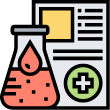

HDL and LDL are two types of Lipoproteins that carry cholesterol to and from the body's cells in the blood.
HDL, known as "good cholesterol" transports cholesterol to your liver from your body, and liver expels cholesterol. Thus HDL aids in removing excess cholesterol which otherwise is highly likely to choking up your arteries.












Get help from our experts for all your queries

Write email or call us